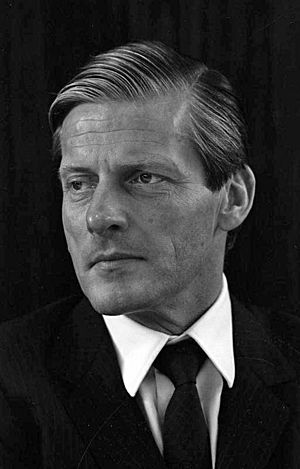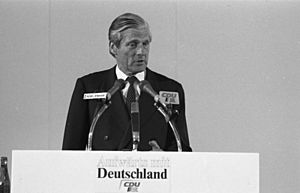Walther Leisler Kiep facts for kids
Quick facts for kids
Walther Leisler Kiep
|
|
|---|---|

Walther Leisler Kiep in 1973
|
|
| Personal details | |
| Born |
Walther Gottlieb Louis Leisler Kiep
5 January 1926 Hamburg, Germany |
| Died | 9 May 2016 (aged 90) Kronberg im Taunus, Germany |
| Political party | CDU |
| Spouse | Charlotte Kiep |
| Children | 4 |
| Occupation | Insurance salesman |
Walther Gottlieb Louis Leisler Kiep (5 January 1926 – 9 May 2016) was a German politician of the Christian Democratic Union (CDU). He was a member of the Bundestag between 1965 and 1976 and again from 1980 to 1982. After switching to state-level politics, he served as minister of economy (1976–77) and minister of finance (1976–80) in Lower Saxony under Ernst Albrecht. In 1982, Kiep was the leading candidate for the CDU in two successive state elections in Hamburg, losing both to incumbent Klaus von Dohnányi. From 1971 until 1992, he was treasurer of his party at the federal level. In this position, Kiep installed a system of unreported income accounts, leading to the CDU donations scandal in 1999.
Contents
Life and family
Coming from a liberal family, Kiep was born on 5 January 1926 in Hamburg to Louis Leisler Kiep, a navy captain and business man, and Eugenie Maria Anna vom Rath. Kiep's maternal grandfather, Walther vom Rath, had been a member of the Prussian House of Representatives from 1894 to 1898 and later a member of the Prussian House of Lords until 1918. His middle name "Leisler" came from Jacob Leisler, a German-born colonist and ancestor of Kiep, who participated in early independence movements in New York. Kiep went to school in Hamburg and Istanbul, achieving his Abitur in 1943 before joining the Wehrmacht. On 20 April 1944, Adolf Hitler's birthday, he joined the Nazi Party. In the same year his uncle, Otto Carl Kiep, was executed by the Nazis for his membership in the Kreisau Circle. After the war, he started to study history and economics, but did not graduate.
Before moving into politics, he worked for the Insurance Company of North America from 1948 to 1955. Starting in 1955, he worked for a company called Gradmann und Holler, an insurance broker company for large businesses. Kiep owned 15 percent of the company in 1982. Kiep also served on Volkswagen's board of directors. Due to his successful business ventures, Kiep was considered to be one of the richest politicians in Germany.
From 1950, Kiep was married to Charlotte Kiep, born 1920. They met when Kiep was only thirteen years old. He needed to visit Fritz ter Meer in Landsberg Prison to ask for his daughter's hand in marriage. They had four children together, sons Walther, Michael and daughters Charlotte and Christiane. Their second son, Michael Jürgen, died in 1975, aged 24. The parents started a foundation for young journalists in his name. From a previous marriage of his wife's, Kiep was stepfather to another son, Edmund.
On 30 November 1974, an assassination attempt was made on Kiep, during which a man fired three shots at the door of his sauna, though he remained uninjured. The assassin was never found and leads hinting towards involvement of the Red Army Faction proved inconclusive. As the German magazine Der Spiegel wrote a year later, some party colleagues allegedly considered it possible that Kiep had staged the attack himself.
Political career

Member of parliament
Kiep became a member of the CDU in the fall of 1961, gaining a seat in the county council of Obertaunus in 1963. Following the 1965 federal election, he became a member of the Bundestag, winning a mandate in the Obertaunus constituency. He retained his seat in 1969 and 1972, this time as part of his party's electoral list in Hessen. In 1972, Kiep was one of only a few CDU parliamentarians who voted yes to the Basic Treaty (Grundlagenvertrag) between West and East Germany. Other supporters of Willy Brandt's Ostpolitik were Richard von Weizsäcker, Karl Carstens and Olaf von Wrangel. During the 1972 federal elections, Kiep was named as prospective Federal Minister of Economic Cooperation and Development in the shadow cabinet of Rainer Barzel. He left parliament on 24 February 1976 to join the state government in Lower Saxony. During his tenure as minister, he also held a seat in the Landtag of Lower Saxony from 1978 to 1980. He regained a seat in the Bundestag following the 1980 election, entering through a place on the electoral list for Lower Saxony. In order to concentrate on his role as leading candidate in his home state of Hamburg, he once again left parliament on 26 April 1982.
Minister in Lower Saxony
1976 saw the state government change in the German Bundesland of Lower Saxony, when the coalition government of the SPD and FDP was unable to agree on a successor to minister-president Alfred Kubel. As a consequence, the CDU used renegade votes from the government camp to elect Ernst Albrecht into office. Albrecht called Kiep into his government, as minister of economy and finance. After the CDU minority government was replaced by a coalition with the FDP in January 1977, Kiep left his position in the ministry for economy, but continued to lead the ministry of finance until 1980.
A controversial topic during his tenure as minister was the search for a radioactive waste site in Lower Saxony. In 1975, three locations had been deemed suitable for further investigation: the salt domes Lutterloh, Lichtenhorst and Wahn. Two years later, however, the state government designated the Gorleben salt dome as a single location for the repository and waste disposal center. In 2011, a commission of enquiry of the Bundestag investigated the award procedure. Journal entries of Kiep's had implied that he was the driving force behind the decision to promote Gorleben, putting the idea forward at a meeting with Albrecht and three federal ministers in Hanover on 11 November 1976. Since he had attended a meeting with delegates from the nuclear power industry on the same day, it was speculated that the lobby had exercised influence on Kiep. Appearing before the committee as a witness, Kiep claimed not to remember the events exactly but said that he considered it "unlikely" that he was the one who proposed Gorleben, because he did not have enough expertise in the matter.
Minister-president Albrecht and Kiep were prominent representatives of the liberal wing of the CDU, who aimed to move their party towards support for the Ostpolitik of the SPD/FDP federal government. In 1976, they lobbied for their party's approval of new treaties with Poland, against conservative figures such as Alfred Dregger, Franz Josef Strauß and Hans Filbinger. This was also considered to be part of a plan of CDU chairman Helmut Kohl to bring the liberal FDP back into a coalition with the Christian Democrats (which was ultimately successful in 1982). That Kiep's work was popular with the FDP was proven in early 1976: the party's Theodor Heuss foundation (de) awarded him with their highest award, which Keip refused in deference to his party affiliation.
In 1978, Kiep served as a special representative for chancellor Helmut Schmidt during a debt crisis in Turkey, mediating between the government of Bülent Ecevit, with whom he developed a friendship, and the International Monetary Fund. Kiep eventually collected 910 million US$ for Turkey from various states.
In the 1980 federal election, Kiep was named as foreign minister in the shadow cabinet of Franz Josef Strauß.
Candidate in Hamburg
In 1982, Kiep served as the leading candidate for the CDU in two separate state elections in his hometown of Hamburg. The first, regular election in June brought a majority of votes for Kiep and heavy losses for the SPD and incumbent First Mayor Klaus von Dohnányi. Since the Green Party gained enough votes to be represented in the Bürgerschaft, the political situation was at a deadlock. After von Dohnányi proved unsuccessful in forming a minority government tolerated by the Greens, new elections were called for December. Kiep was once again the CDU candidate, but in "an election upset", the SPD was able to get enough votes to form a government on their own. This was seen as a sign of support of Hamburg's population for former chancellor Helmut Schmidt (born in Hamburg), who had been replaced in a constructive vote of no confidence by the CDU in October.
Death
Kiep died on 9 May 2016, surrounded by his family in his home in Kronberg im Taunus in Hesse, at the age of 90.
Awards and memberships
Awards
- 1977: Cravat man of the year
- 1994: Order of Merit of the Federal Republic of Germany
- 1998: Lower Saxony Order of Merit
Memberships
From 1984 to 2000, Kiep was chairman of the Atlantik-Brücke. From 1994 to 2000 he served as president of the EBS University of Business and Law. He was a member of the International Advisory Boards of Fuji Bank and Columbia University, as well as a member of the board of Volkswagen and Deutsche Bank.
See also
 In Spanish: Walther Leisler Kiep para niños
In Spanish: Walther Leisler Kiep para niños

